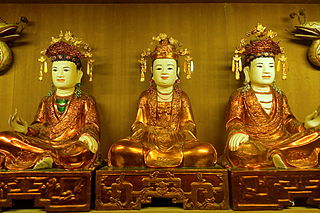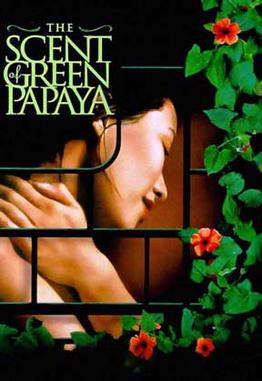Related Research Articles
Articles related to Vietnam and Vietnamese culture include:
Traditional Vietnamese personal names generally consist of three parts, used in Eastern name order.
Vietnamese literature is the literature, both oral and written, created largely by the Vietnamese. Early Vietnamese literature has been greatly influenced by Chinese literature. As Literary Chinese was the formal written language for government documents, a majority of literary works were composed in Hán văn or as văn ngôn. From the 10th century, a minority of literary works were composed in chữ Nôm, the former writing system for the Vietnamese language. The Nôm script better represented Vietnamese literature as it led to the creation of different poetic forms like Lục bát and Song thất lục bát. It also allowed for Vietnamese reduplication to be used in Vietnamese poetry.

Vietnam competed at the 2005 Southeast Asian Games in the Philippines under the IOC country code VIE. By sending a delegation of 516 athletes and competing in 33 out of 40 sports and in 352 out of a total of 439 events, it aimed for a top three placing in the medals table. The final result showed that the Vietnamese team has attained its goal by ranking first in the medal tally with 18 gold, 24 silver and 11 bronze medals. The chief of mission to the games was Nguyen Hong Minh.
Vietnamese poetry originated in the form of folk poetry and proverbs. Vietnamese poetic structures include Lục bát, Song thất lục bát, and various styles shared with Classical Chinese poetry forms, such as are found in Tang poetry; examples include verse forms with "seven syllables each line for eight lines," "seven syllables each line for four lines", and "five syllables each line for eight lines." More recently there have been new poetry and free poetry.

Princess Liễu Hạnh is one of The Four Immortals in Vietnamese folk religion, and also a leading figure in the Four Palaces belief of the Đạo Mẫu, in which she governs the Earth realm and represents the Heaven realm on behalf of Mẫu Cửu Trùng Thiên.
The Chinh phụ ngâm is a poem in classical Chinese written by the Vietnamese author Đặng Trần Côn (1710–1745). It is also called the Chinh phụ ngâm khúc (征婦吟曲), with the additional -khúc emphasizing that it can be performed as a musical piece not just read as a plain "lament".
Đặng Trần Côn was the author of the Chinh phụ ngâm a masterpiece of chữ Hán literature of Vietnam.

Phan Huy Ích was a Vietnamese poet. Phan Huy Ich served two dynasties, both the Le dynasty then the Tay Son uprising. About the time of the collapse of the Tay Son dynasty he wrote the preface to Ngô Thì Nhậm's last book on Buddhism True Lam Tong Chi Nguyen Thanh. He was father of Phan Huy Chú (1782–1840) author of Lich Trieu Hien Chuong Loai Chi (1819).

Princess Lê Thị Ngọc Hân (1770–1799) was a Vietnamese princess of the Later Lê dynasty and Empress Consort of emperor Quang Trung of the Tây Sơn dynasty.
Phan Đăng Lưu was a prominent 20th century Vietnamese revolutionary, politician, intellectual and journalist.

The Scent of Green Papaya is a 1993 Vietnamese-language French drama film directed by Vietnamese-French director Tran Anh Hung, and starring Tran Nu Yên-Khê, Man San Lu, and Thi Loc Truong.
Lý Thị Ngọc Kiều, dharma name Diệu Nhân (妙因), was a princess during the Lý dynasty in Vietnamese history. She was the 17th leader of the Vietnamese Vinītaruci school of Buddhism.
The Arbitrator is a 2017 Vietnamese crime drama series, based on the Israel crime drama series The Arbitrator (Ha-Borer).

The 10th Central Committee of the Communist Party of Vietnam was elected at the 10th National Congress of the Communist Party of Vietnam. The 10th Central Committee elected the 10th Politburo and the 10th Secretariat.

Army and warfare made their first appearance in Vietnamese history during the 3rd millennium BC. Throughout thousands of years, wars played a great role in shaping the identity and culture of people inhabited the land which is modern day Vietnam.
The Tale of Từ Thức Marrying a Goddess or Từ Thức Meeting Gods is a Vietnamese legend told in Truyền kỳ mạn lục by Nguyễn Dữ in the 16th century and based on the Folktale of Từ Thức Cave. It follows the life of Từ Thức in the Trần dynasty who meets and marries a goddess in the godly realm before leaving his wife to revisit his hometown, unaware that countless ages have passed in the mortal world since then.

On 27 January 2016, the 12th National Congress elected 20 people to serve as alternates of the 12th Central Committee of the Communist Party of Vietnam (CPV) for the electoral term 2016–2021. The Central Committee is the highest decision-making institution in the CPV and Vietnam when the Party's National Congress and the Politburo are adjourned. In between two congresses, the Central Committee is responsible for organising and directing the implementation of the Party's Political Platform, Charter and resolutions adopted at the National Congress. It decides on guidelines and policies in all relevant fields, domestic or foreign. The sitting Central Committee is responsible for convening the next National Congress. Alternates are party cadres who have the right to speak and attend meetings of the Central Committee but do not have the right to vote. They are 45 years of age or younger and undergo long-term political education to prepare them for future assignments and election as a member of the Central Committee. Candidates for alternates need to meet the same standards as Central Committee members. Work assignments of alternates are decided upon by the Politburo. Lastly, alternates are responsible to and report on their work to the Central Committee.

The 23rd Vietnam Film Festival was held from November 21 to November 25, 2023, in Da Lat City, Lâm Đồng province, Vietnam, with the slogan "Building a Vietnamese film industry rich in national identity, modern and humane".
References
- ↑ Bonnie G. Smith The Oxford Encyclopedia of Women in World History Volume 1 - Page 107 - 2008 "One candidate for inclusion would surely have been the Annamese poet Doan Thi Diem (1705-1748), whose biography of the goddess Liễu Hạnh is one of the most famous literary works of the period."
- ↑ Anthony Bott - Dimensions: Texts from Asia for the Upper Secondary English Classroom Page 7 1998 "The Lament of a Warrior's Wife - Đoàn Thị Điểm. Đoàn Thị Điểm was born in Vietnam in 1705 and died in 1748. She was a poet, an educated woman, and her most important work was the long narrative poem from which this extract has been taken.
- ↑ Patricia M. Pelley Postcolonial Vietnam: New Histories of the National Past 2002 - Page 125 "One of the most celebrated poets was Nguyễn Trãi, whose famous victory poem, poems addressed to military personnel, poems in classical Chinese, and, most critically, his poems in nom were granted a place of special honor in the literary canon. The poet Đoàn Thị Điểm was also greatly esteemed for "Lament of a Soldier's Wife", a poem she wrote in classical Chinese. The considerable merit bestowed on Lê Quý Đôn stemmed from the astuteness of his work overall and his phenomenal productivity: he authored at least three chronicles, several volumes of poetry, two encyclopedic compilations, and.."
- ↑ Nguyễn, Văn Hồng (2003). Nữ Trung Tùng Phận (in Vietnamese). Tây Ninh. p. 5.
{{cite book}}: CS1 maint: location missing publisher (link) - ↑ Đoàn, Thị Điểm (1933). Nữ Trung Tùng Phận [Duties of Women](PDF) (in Vietnamese). Sài Gòn: Nhà in Bảo Tồn.